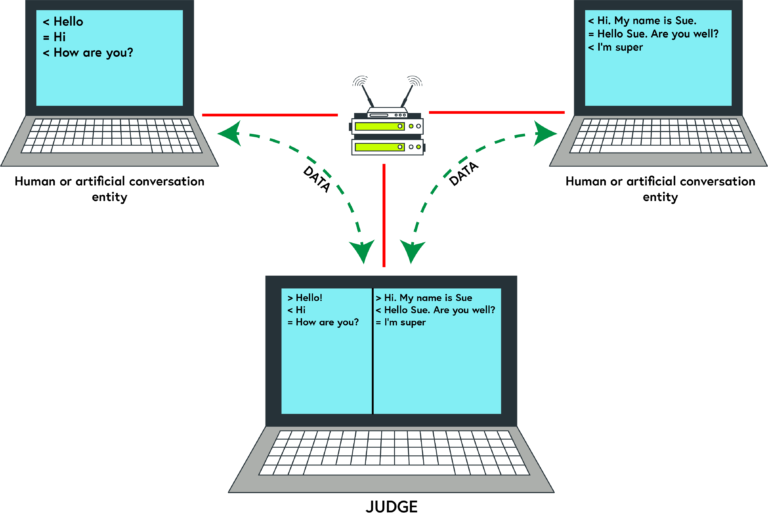Alan Turing and imitation

Share this step
Automatic Computing Engine (1947)
Intelligent Machinery (1948)
In the 1948 version of the imitation game, a mathematician and chess player acted as ‘B’ operating a ‘paper machine’, while two ‘poor’ chess players, A and C, unseen to each other, played across two rooms. Turing felt it might not be easy for C to say whether they were playing A or the paper machine: ‘C may find it difficult to tell which he is playing’(Shah 2011: 431).
….the idea of ‘intelligence’ is itself emotional rather than mathematical
Computing Machinery and Intelligence (1950)
| Simultaneous comparison test | Viva voce test |
| A three-participant game, or simultaneous comparison test involving one human interrogator questioning, by text only, two hidden entities, one human and one machine. In this game, the role of the ‘hidden human’ is to be truthful. The interrogator’s task is to determine which is the human and which is the machine from the answers both give to the interrogator’s question. | A two-participant game or viva voce involves a human interrogator questioning one hidden entity by text interaction only and has to determine whether the answers received are from a human or a machine. |
The simultaneous comparison test
 (Adapted from Shah 2011a) Click to expand
(Adapted from Shah 2011a) Click to expandThe viva voce test
Your task
Discuss Alan Turing’s thought experiment known as Turing’s Imitation Game or the Turing test. What do you consider to be the strengths and weaknesses of this as an interpretation of artificial intelligence?
Further resources
Arai, N. (2017). Could an AI Pass the Entrance Exam for the University of Tokyo? TED https://www.ted.com/talks/noriko_arai_can_a_robot_pass_a_university_entrance_exam?utm_campaign=tedspread&utm_medium=referral&utm_source=tedcomshare
References
Artificial Solutions. (2019). Conversational AI Platform. Artificial Solutions https://www.artificial-solutions.com/
Copeland, B.J. (2000). What is Artificial Intelligence. AlanTuring.net Reference Articles on Turing http://www.alanturing.net/turing_archive/pages/Reference%20Articles/what_is_AI/What%20is%20AI03.html
Encyclopaedia Britannica. (2005). Imitation Behaviour https://www.britannica.com/topic/imitation-behaviour
Heyes, C.M. and Ray, E.D. (2000). What is the Significance of Imitation in Animals? Advances in the Study of Behavior, 29, 215-245
McElroy, M. (2013). A First Step in Learning By Imitation, Baby Brains Respond to Another’s Actions. UW News https://www.washington.edu/news/2013/10/30/a-first-step-in-learning-by-imitation-baby-brains-respond-to-anothers-actions/
Shah, H. (2011a.). Deception-detection and Machine Intelligence in Practical Turing Tests [Thesis]. Reading University
Shah, H. (2011b). Turing’s Misunderstood Imitation Game and IBM’s Watson Success. The 2nd Towards a Comprehensive Intelligence Test (TCIT). Symposium on Reconsidering the Turing test for the 21st Century AISB 2011 Convention, York University, April
Shah, H. (2012). Vladimir Veselov Wins Colonnade Trophy. Turing100 https://turing100.blogspot.com/2012/06/vladimir-veselov-wins-colonnade-trophy.html
Shah, H. (2018). Turing’s Substantive vs. Simulated Intelligence: Can a Machine Answer Any Question? Interdisciplinary Conference on Rethinking, Reworking and Revolutionising The Turing test, Edinburgh University, November 15-16
Turing2014. (2014). Eugene Goostman Machine Convinced 33.33% of a New Set of Judges at The Royal Society 6-7 June 2014, following its 29.17% performance at Bletchley Park in 2012. Turing2014. 60th Anniversary of Alan Turing’s Untimely Death http://turingtestsin2014.blogspot.com/2014/06/eugene-goostman-machine-convinced-3333.html
University of Reading. (2008). Can a Machine Think? Results from the 18th Loebner Prize Contest https://www.reading.ac.uk/15/research/ResearchReviewonline/featuresnews/res-featureloebner.aspx
Share this
Artificial Intelligence: Distinguishing Between Fact and Fiction

Artificial Intelligence: Distinguishing Between Fact and Fiction


Reach your personal and professional goals
Unlock access to hundreds of expert online courses and degrees from top universities and educators to gain accredited qualifications and professional CV-building certificates.
Join over 18 million learners to launch, switch or build upon your career, all at your own pace, across a wide range of topic areas.
Register to receive updates
-
Create an account to receive our newsletter, course recommendations and promotions.
Register for free







